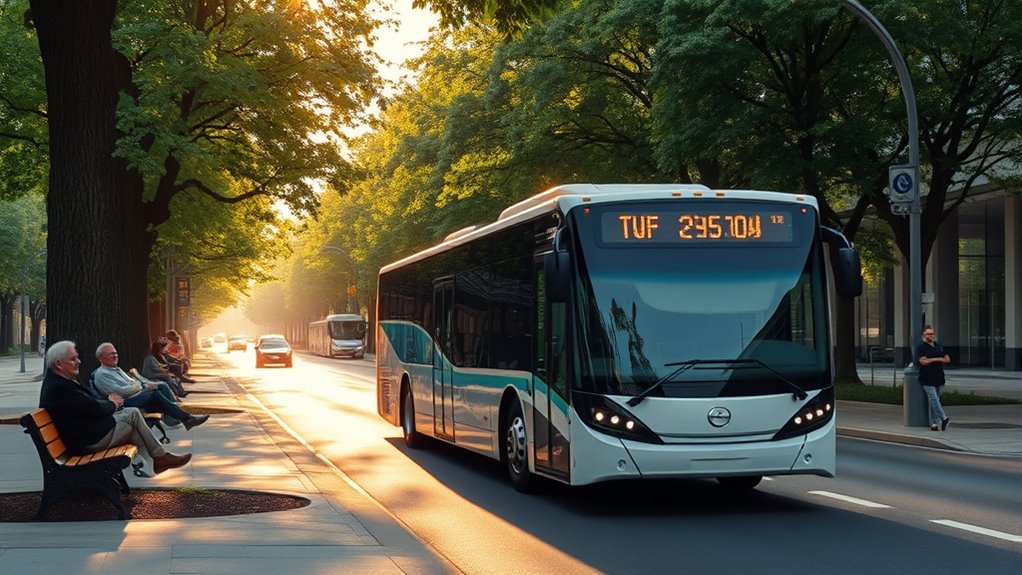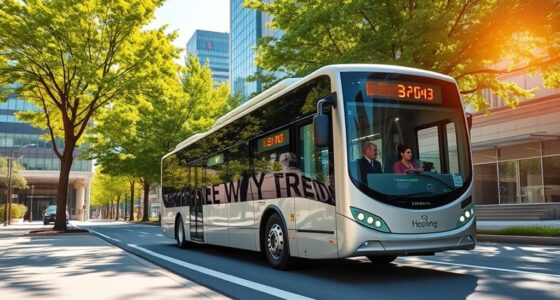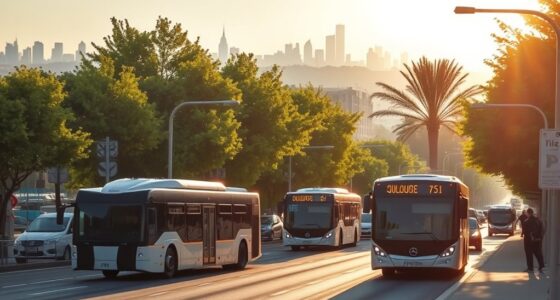Electric buses reduce urban noise pollution by operating with near-silent motors, which cut down engine and exhaust sounds in city areas. Their quiet operation creates a calmer environment for residents, especially near sensitive places like schools and hospitals. Advances in battery technology allow these buses to run longer and charge faster, further lowering noise from stops and maintenance. If you want to understand how this technology is shaping the future of quieter, cleaner cities, there’s more to discover.
Key Takeaways
- Electric buses operate with near-silent motors, significantly reducing engine and exhaust noise in urban areas.
- Advances in battery technology allow longer routes and fewer recharges, decreasing operational noise levels.
- Reduced noise pollution from electric buses enhances the peacefulness of neighborhoods, especially near sensitive zones.
- Quieter transportation options improve public perception and community support for sustainable urban transit.
- Lower noise levels contribute to healthier, more livable cities by decreasing overall urban noise pollution.

As cities grow busier and noisier, electric buses are emerging as a quiet alternative that can substantially reduce urban noise pollution. Unlike traditional diesel-powered buses, electric models operate with near-silent motors, which significantly cut down on the loud engine and exhaust noises that contribute to city soundscapes. This shift not only benefits residents by creating a more peaceful environment but also encourages a positive public perception of cleaner, more sustainable transportation options. When you see electric buses gliding silently through streets, it’s a clear sign that urban noise can be managed without sacrificing mobility.
A key factor in the widespread adoption of electric buses is advancements in battery technology. Modern batteries are more efficient, durable, and quicker to charge than earlier models, making electric buses more practical for daily use. With improved energy storage capabilities, buses can travel longer distances between charges, reducing the need for frequent stops and further lowering noise levels during operation. The evolution of battery technology also means these vehicles produce less mechanical noise during charging and operation, which is pivotal in densely populated areas where noise pollution can be a serious concern. As technology continues to improve, electric buses will only become quieter, more reliable, and more appealing to city planners and commuters alike.
Public perception plays a fundamental role in the transition towards electric buses. When communities see these vehicles operating smoothly and quietly, they start to view electric transportation as a positive step forward. Many people appreciate the environmental benefits, such as reduced air pollution and greenhouse gas emissions, but the quieter operation adds a new layer of appeal. It helps reshape the image of public transit from noisy and disruptive to modern and eco-friendly. This shift in perception encourages more people to support policies and investments that prioritize electric buses, fostering a more sustainable urban environment. As more residents become aware of the benefits—less noise, cleaner air, and quieter streets—they’re more likely to advocate for continued adoption and expansion.
Ultimately, the combination of technological progress and changing public attitudes makes electric buses a powerful tool in reducing urban noise pollution. Their silent operation improves daily life by creating calmer neighborhoods, especially near schools, hospitals, and residential areas. The ongoing development of battery technology ensures these vehicles will only get better over time, and as public perception continues to favor sustainable solutions, the momentum toward cleaner, quieter cities grows stronger. Additionally, AI-driven innovations in transportation management can optimize routes and schedules, further reducing noise and emissions. By embracing electric buses, you’re contributing to a future where urban living is not only more sustainable but also markedly more peaceful.
Frequently Asked Questions
How Do Electric Buses Compare to Hybrid Buses in Noise Reduction?
You’ll find electric buses are quieter than hybrid buses because they run solely on batteries, producing less engine noise. As you consider noise reduction, remember that battery recycling and expanding charging infrastructure help make electric buses more sustainable and accessible. These advancements guarantee quieter operation, reduce emissions, and improve urban life, making electric buses a better choice for noise-sensitive areas. This shift also supports cleaner, healthier cities for everyone.
What Maintenance Challenges Are Unique to Electric Buses?
You’ll face unique maintenance challenges with electric buses, mainly related to battery degradation over time and ensuring proper charging infrastructure. Battery health requires regular monitoring and eventual replacement, which can be costly. Additionally, maintaining reliable and efficient charging stations demands ongoing upkeep and upgrades. These issues demand proactive management, but they’re offset by fewer moving parts and less routine maintenance compared to traditional buses.
Do Electric Buses Significantly Reduce Overall City Noise Levels?
Yes, electric buses markedly reduce overall city noise levels by minimizing electric noise compared to traditional diesel engines. As you ride or observe them, you’ll notice a quieter urban environment, contributing to urban quiet. This reduction in noise pollution enhances the quality of life for residents, especially in busy city centers. Electric buses help create a calmer, more peaceful city atmosphere, making urban spaces more pleasant and less stressful for everyone.
How Do Electric Buses Impact Urban Air Quality Besides Noise?
Electric buses improve urban air quality by eliminating electric emissions, which reduces harmful pollutants like nitrogen oxides and particulate matter. This cleaning of emissions helps you breathe cleaner air every day. Additionally, their quieter operation encourages better urban airflow, dispersing pollutants more effectively. As a result, your city becomes healthier, with improved air quality that benefits residents’ health and overall well-being.
What Is the Lifespan and Durability of Electric Bus Batteries?
Electric bus batteries generally last between 8 to 15 years, depending on usage and maintenance. Battery longevity hinges on proper care, regular monitoring, and efficient charging infrastructure. You’ll want to guarantee that the charging stations support fast charging and proper voltage to extend battery life. Frequent maintenance and avoiding deep discharges also help improve durability, so your electric bus remains reliable and efficient throughout its lifespan.
Conclusion
By choosing electric buses, you help cut urban noise pollution substantially—studies show they can reduce city noise levels by up to 50%. This not only makes your daily commute quieter but also fosters a healthier, more peaceful environment. As cities embrace cleaner transportation, you’ll enjoy improved quality of life and a more sustainable future. So, next time you see an electric bus, remember, you’re part of a movement that’s making cities quieter and better places to live.









